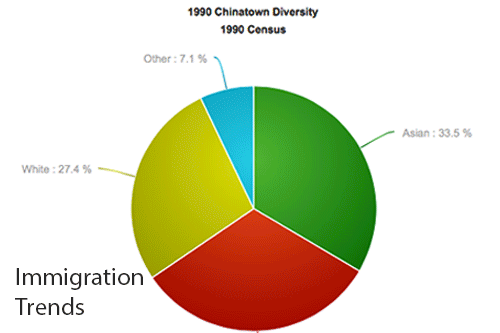
Education, medical benefits and opportunity: these three ideals continually arise when Asian immigrants speak about their decision to settle in the less than one square mile district that makes up Downtown Los Angeles' Chinatown.
"My family told me, 'Go over there. Maybe life will be better.' From that point of view, the future, the education, it remains true," said Joe Pham, 44, who came to LA from Saigon, Vietnam with his brother when he was 15. "People still come for a much better life, a better living, better job security."
"This country is much better than my country in many ways," said Sochanda Mey, 29, who immigrated to Los Angeles from Cambodia to live with her cousin when she was 23. "The hospitals, the health care, safety, it's all better."
Nearly eight thousand miles, a year-long trip across the ocean or a 16-hour flight separates the people of this community from their Asian roots, but still, their tradition remain the same.
Whether hailing from Vietnam or Cambodia, Beijing or Indonesia, regardless of the cultural background and the turmoil these communities face in the far East, once these pilgrims settle on their new land near City Hall, they come together as one.
"The Vietnamese culture is pretty much the same here as it was back in Saigon," said Santron, who immigrated from Saigon with his mother, two brothers and sister as a child. "It's a lot of family stuff, working all day and then spending the nights with one another. There's a little bit of hostility between communities like Vietnam and China, but it's pretty much the same everywhere."
With immigrants from many countries living and working shoulder-to-shoulder, it forces them to put aside many differences and make each other's lives more productive.
Mey, who is a manager at a small jewelry stand in the Saigon Market, admitted that she is a very quiet person that does not like to speak with new people; however, coming to America where she only knew her cousin forced her to branch out.
She says that the owners and managers of the surrounding stands, who hail from China and Indonesia, have embraced her and have become some of her closest friends.
"It's America, man. To me, it's still number one in everything."
While it is easy for the younger generation like Mey to meet new people and assimilate with the Americanized culture, many elderly residents are not as open to adjusting to these new lifestyle.
"A majority of 50 to 80-year-olds say that come here for their children, for the future," Pham said while speaking over the counter at Mochi Cat, a light food and boba stand he manages with his brother. "As they live here they get used to it and feel more comfortable with the foreign language, but I think they would prefer to live in Vietnam."
One way that they overcome this language barrier while maintaining an income and business is using their children to help manage their stores.
Nick, 26, who would not give his last name, also came to LA from Cambodia with his parents who opened a cell phone accessories stand in the Saigon Market.
While some of these second-generation kids may see their inherited role as a burden, Nick uses his need to step in for his parents as another learning opportunity.

"I like this stuff. I can always learn about new stuff, new technology, so I enjoy it," Nick said while stapling plastic containers around a new shipment of phone cases. "The competition is something that I'm working hard on to overcome."
Parents are now putting more and more of these second-generation Chinatown residents into this situation because the number of them available has grown tremendously.
From 1990 to 2000, the Asian population in Chinatown more than doubled, going from 33.5 to 70.6 percent, with more than 54 percent of the 2000 population being at least 34-years-old, according to the decadal United States Census.
Since the dramatic increase in 2000, the population slightly dropped to 65 percent in 2010, but the optimism immigrants have to continue coming to America, and Chinatown specifically, remains the same.
"It's the freedom, that's the main thing," Santron said. "Whatever you make, you don't have to worry about the government taking that from you."
"It's more organized, more systemly, more legitimate, it's all better," Pham said. "It's America, man. To me, it's still number one in everything."